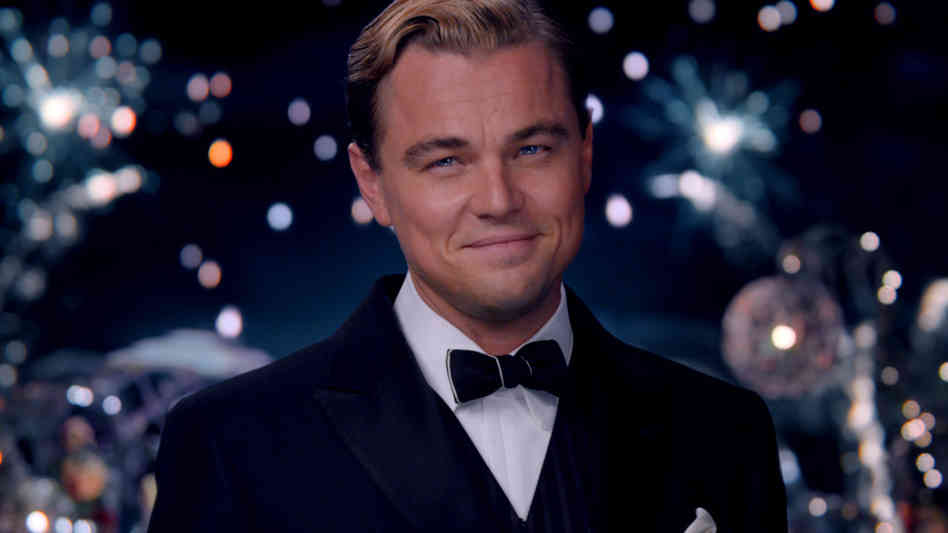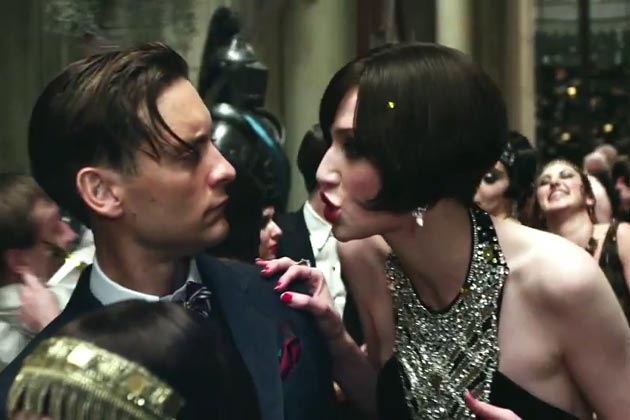
Cutting to the chase: The Great Gatsby is one of my favorite adaptations of literature to film. And I was ready to hate it. I was ready to join in the broiling ranks of intellectuals and former AP English students with baseball bats and brass knuckles, rallied in fury around Baz Luhrmann's house. The boring vastness of Australia, the purposeless insanity of Moulin Rouge and even the sometimes-overdone-ness of the rather great Romeo + Juliet--all of these prepared me to be disappointed. But it succeeds because it tells the story of F. Scott Fitzgerald's novel, and doesn't have to tell the book.
Just so you know: Nick Carraway (played sufficiently by Tobey Maguire) comes to New York to make it as a stockbroker. America is the land of immediate opportunity and golden, wine-spouting success. "The tempo of the city had changed sharply," he tells us, "The buildings were higher, the parties were bigger, the morals were looser, and the liquor was cheaper." Nowhere is this more true than in the Playboy mansion behind Nick's tiny house, owned by the enigmatic, legendary Mr. Gatsby. For reasons unclear, Mr. Gatsby invites Nick to his house personally and the two become friends, entangling Nick with Mr. Gatsby's uncertain past and his dreams to rekindle his love with Daisy Buchanan, Nick's cousin who has long been married to refined, old-money Tom Buchanan. It gets crazier. Go see it.

It doesn't try and imitate the pacing of the novel (except in the vital and brilliantly-executed ice block scene) but instead fevers past us like a convertible overflowing with hip-hop drunk white people on the way to get the evening smashed. It doesn't pretend that it has the time to lazily slip into ambiguous characterizations--Tom Buchanan busts onto screen playing polo and strutting through his East Egg house; (which is as lavishly representative of his character as is Joel Edgerton, whose presence overwhelms and made me wonder "didn't this guy win an Oscar for something?" He hasn't, but the film makes you wonder why.) Daisy is introduced in a flurry of billowing curtains that takes one's breath away as efficiently as Fitzgerald's prose does. Gatsby's overflowing fireworks introduction is as hilarious as it is majestic, and Myrtle and Catherine steal the show with their five minutes on screen and Nick's first real party.
I did feel babied with the fourth shot of T.J. Eckleburg's godlike glasses, accompanied by a voiceover that "God sees everything". Still, more than ever, this director, accused of being the most bombastic of our time, delivers a story that appears so clearly to be near his heart.

The green light, only mentioned a few times in the book, dominates Gatsby's vision as well as ours. The music, a sort of mash-up between Gershwin and Fergie, Jay-Z and Harlem Jazz, instructs us more about the 1920's than any degree of dialogue about it could. We know what they were like because we know what it is like today. The characters don't talk about the issues that startle us--the faceless blacks without dialogue or place besides on the stage, the women whose say is trivial to the men--and instead of having to talk about it we see it happen. Like Nick and Jordan in the hotel scene, we are hapless witnesses to the great crimes of our time.
And crimes there are, in abundance. Though Tom is the first we hate, for his bigotry, infidelity, and cruelty, he seems so clearly a product of his time that I almost forgave him. Gatsby's past is not as clean as he at first assures Nick, and for all of his assumed manners, the animal comes out in that great ice-block scene that makes us, like Daisy, shudder and want to turn away. Leonardo DiCaprio gives Gatsby the shine of the celebrity, the charm of the con, and the pain and hope of the scorned lover. He is just imperfect enough to play Gatsby.

Here--and in the novel--Nick is a stroke of genius because he embodies the audience member. Like him, we have always been taught to see the best in people. Like him, we go with the flow, allowing the rhythm to overwhelm us and the current of the times to carry us along. We seek the prosperity that others think we should, and deify those who achieve it. When a drunk Nick steps onto the balcony in his underwear and says that he feels connected to everything, "within and without", we point our finger at the screen and say "I know what you mean." But what the novel asks us to consider is if our neutrality has any merit, and if we are really even living our own lives. In the end, there is no one to side with.
And isn't that a message for our generation? Our inheritances as a culture and a nation are more sickening than wonderful. Among the worst is what we mean when we say 'Love'. A sort of American Nirvana, complete with raucous sexuality, wealth and prosperity, and a fulfillment of all selfish dreams above all else. Whether you are New Money or Old Money, Tom Buchanan, Jay Gatsby, or Wilson, pursuing that American Dream is destructive. It is selfish. It is finally meaningless.

F. Scott Fitzgerald's novel raised a voice of warning, but captured it with charitable neutrality. The film does the same--it presents the brightness and fun of it all, and even the humor and heart of all its characters. Life is fun, full of new surprises and beautiful sights. For me, however, it asks a question: "Where do we go from here?" The past is behind us, freezing solid as we plunge on. The future is unknowable, unplannable. But what do we choose to do now? As a nation, as individuals, as families?
We'll see if I figure it out. For now, go see the movie. Think about it.
Everybody here seems to be on the right page with what to do, but the style just overtakes everything they want to do. Nice review Ted.
ReplyDelete